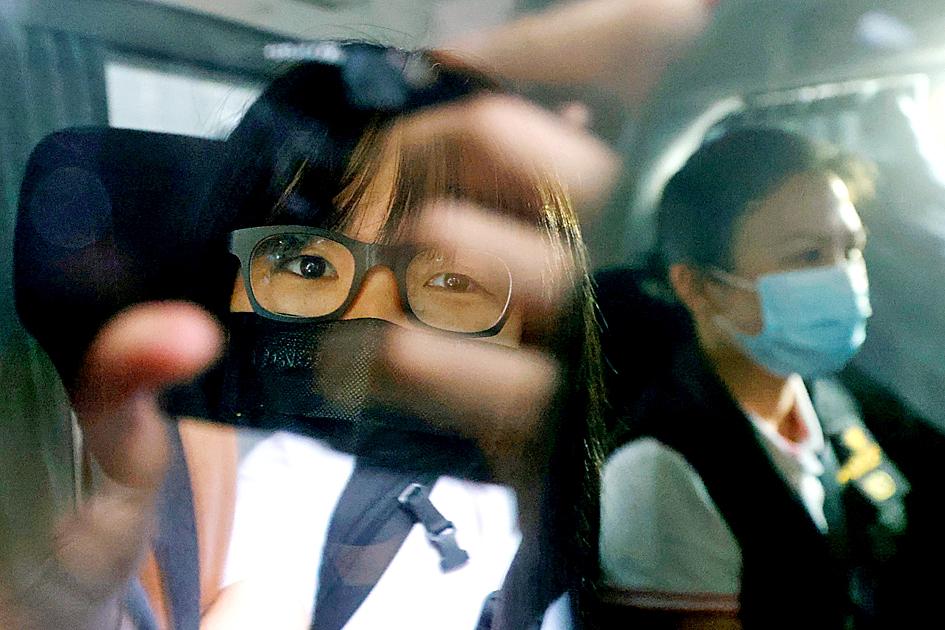Dozens of local community politicians in Hong Kong yesterday swore a newly required loyalty oath to China, after hundreds of their colleagues quit in protest as authorities try to purge the territory of “unpatriotic” elements.
District councils are the only political office in Hong Kong where all seats are directly elected by residents.
They deal with everyday local issues like bus routes, trash collection and playgrounds, but they have also become a symbol of residents’ urge for a greater say in how Hong Kong is run.

Photo: REUTERS
In late 2019, toward the end of months of huge democracy protests, opposition candidates critical of China’s rule won landslide victories, hammering pro-Beijing candidates.
China has since responded with a crackdown on dissent, as well as an overhaul of the territory’s political system that reduces the number of directly elected officials and vets politicians for their perceived patriotism.
Yesterday, the first 24 councillors took the oath in a closed-door ceremony, the Hong Kong government said.
Similar ceremonies have been held for other sectors, including civil servants, government officials and lawmakers.
However, those who swear allegiance can still be disqualified. Under the new rules imposed by Beijing earlier this year, a national security committee can disqualify anyone deemed an “anti-China” element or disloyal.
“If we have doubts on certain councilors’ oath-taking, and could not completely trust whether they have pledged loyalty and allegiance, we will give them the opportunity to explain... If their oaths are invalid in the end, they will be disqualified,” Hong Kong Chief Executive Carrie Lam (林鄭月娥) said earlier this week.
About 180 district councilors are expected to take oaths in the coming weeks, and those who refuse to attend would lose their seats.
However, a majority of the elected councilors have quit rather than adhere to the vetting process. So far, 260 councilors — more than half of the 452 elected members — have resigned.
Oath-taking “has become the regime’s tool to keep you on a leash. They want to eliminate the pro-democracy camp in Hong Kong,” said former Sai Kung District councilor Debby Chan (陳嘉琳), who resigned in July.
Since the 2019 protests, China has imposed a National Security Law that criminalized much dissent and began remolding Hong Kong in its own authoritarian image. Several district councilors are among the more than 60 people who have been charged with national security crimes, the vast majority for their political views.
In the latest prosecution, three leading members of the group behind Hong Kong’s annual Tiananmen vigils appeared in court.
On Thursday, police raided a museum they ran dedicated to the victims of Beijing’s deadly 1989 crackdown.
The three leaders were hit with a subversion charge after they refused to cooperate with a national security investigation.
Before her court appearance, barrister Chow Hang-tung (鄒幸彤), one of those charged, wrote on Facebook: “If they have written the script to eliminate our freedom, then obedience and cooperation will only help them reach their goal quicker and easier.”
In court, she told the judge that the charges were “absurd.”

MAKING WAVES: China’s maritime militia could become a nontraditional threat in war, clogging up shipping lanes to prevent US or Japanese intervention, a report said About 1,900 Chinese ships flying flags of convenience and fishing vessels that participated in China’s military exercises around Taiwan last month and in January have been listed for monitoring, Coast Guard Administration (CGA) Deputy Director-General Hsieh Ching-chin (謝慶欽) said yesterday. Following amendments to the Commercial Port Act (商港法) and the Law of Ships (船舶法) last month, the CGA can designate possible berthing areas or deny ports of call for vessels suspected of loitering around areas where undersea cables can be accessed, Oceans Affairs Council Minister Kuan Bi-ling (管碧玲) said. The list of suspected ships, originally 300, had risen to about 1,900 as

Right-wing political scientist Laura Fernandez on Sunday won Costa Rica’s presidential election by a landslide, after promising to crack down on rising violence linked to the cocaine trade. Fernandez’s nearest rival, economist Alvaro Ramos, conceded defeat as results showed the ruling party far exceeding the threshold of 40 percent needed to avoid a runoff. With 94 percent of polling stations counted, the political heir of outgoing Costa Rican President Rodrigo Chaves had captured 48.3 percent of the vote compared with Ramos’ 33.4 percent, the Supreme Electoral Tribunal said. As soon as the first results were announced, members of Fernandez’s Sovereign People’s Party

MORE RESPONSIBILITY: Draftees would be expected to fight alongside professional soldiers, likely requiring the transformation of some training brigades into combat units The armed forces are to start incorporating new conscripts into combined arms brigades this year to enhance combat readiness, the Executive Yuan’s latest policy report said. The new policy would affect Taiwanese men entering the military for their compulsory service, which was extended to one year under reforms by then-president Tsai Ing-wen (蔡英文) in 2022. The conscripts would be trained to operate machine guns, uncrewed aerial vehicles, anti-tank guided missile launchers and Stinger air defense systems, the report said, adding that the basic training would be lengthened to eight weeks. After basic training, conscripts would be sorted into infantry battalions that would take

GROWING AMBITIONS: The scale and tempo of the operations show that the Strait has become the core theater for China to expand its security interests, the report said Chinese military aircraft incursions around Taiwan have surged nearly 15-fold over the past five years, according to a report released yesterday by the Democratic Progressive Party’s (DPP) Department of China Affairs. Sorties in the Taiwan Strait were previously irregular, totaling 380 in 2020, but have since evolved into routine operations, the report showed. “This demonstrates that the Taiwan Strait has become both the starting point and testing ground for Beijing’s expansionist ambitions,” it said. Driven by military expansionism, China is systematically pursuing actions aimed at altering the regional “status quo,” the department said, adding that Taiwan represents the most critical link in China’s